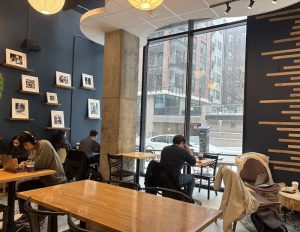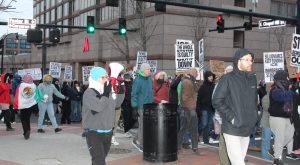Toni Hall faces herself in a wall-length mirror, moving her arms and legs in rhythmic motions. Fourteen women follow behind her. There’s no music, just the clicks of Hall’s tongue twice before each numeric count, “one, *click*, *click*; two,*click*, *click*; three…,” and the sounds of feet colliding with the dance floor at the Hayti Heritage Center.
The Monday afternoon African dance classes, hosted by instructors Hall and Ivy Burch, offer a bit of cultural continuity at the center. The classes meet in the Baba Chuck Dance Studio, named after Chuck Davis, the legendary African dance instructor from Raleigh with whom Hall danced, and whose legacy she now carries on.
The Hayti Heritage Center, founded in 1975, still strives to be a hub of Black culture and art in the Triangle area. But two years after the COVID-19 pandemic, the center is struggling to match prior attendance numbers. Fifty years after its founding, it faces a year of rebuilding.
The center sits in the historic St. Joseph’s AME Church building in the heart of Hayti. The predominantly Black neighborhood suffered greatly in the 1970s when the Durham Freeway cut through it, displacing thousands of families and hundreds of businesses. The church was one of few historic Hayti structures that was saved.
Now, the Hayti center faces its own survival challenges.
“In 50 years, Hayti has survived ups and downs across the board, like the church before it,” said Angela Lee, executive director of the center.

The pandemic’s shadow
Lee, a soft-spoken woman who speaks with a slight Southern drawl, has led the Hayti center for 12 years, including through the challenges of the pandemic. Standing in the center’s entrance, where a photographic exhibit describing the “The Legacy of Hayti” fills the wall behind her, she explains that 2025 will be a big year for the center.
In addition to its 50th anniversary, the center is celebrating the 30th anniversary of its Hayti Heritage Film Festival, the 25th anniversary of the African American Quilters Circle’s residence at the center, and the 20th anniversary of its annual Jambalaya poetry slam.
St. Joseph’s church has a long history of celebrating Black culture and art. The 400-seat historic performance hall – repurposed from the old church sanctuary – has hosted musical performances from jazz artists Dexter Gordon and singer Melba Moore, to name a few. The Hayti center previously ran the Bull Durham Blues Festival and organized performances by the NC Jazz Ensemble and Durham Symphony Orchestra, among others.
Yet the shadow of the pandemic lingers.
Since the start of the COVID pandemic, 82 businesses in downtown Durham have closed or relocated and arts organizations have suffered more than $20.5 million in lost revenue. Beyu Caffe, a Black-owned, downtown Durham restaurant and jazz club, closed its doors in mid-2024. Copa, a Cuban restaurant in downtown Durham, took a downturn during COVID and closed in August of 2024.
A July 2021 report by the Durham Arts Council, using survey data from 2020 and 2021, predicted that Durham’s arts, entertainment, and recreation nonprofit sector would take more than 2 1/2 years to recover from the pandemic.
The Hayti center survived the pandemic but is “still recovering,” Lee said. Lee suspects its recovery will take closer to five years.
Before the pandemic, the center was growing. When Lee started her job in 2013, the center welcomed nearly 22,000 individuals with online, in-person, and collaborative offerings. In 2019, the year before COVID, that number increased to nearly 59,000 people.
“Then COVID hit,” she said.
The center responded as many other organizations did: it moved programming online, minimized staff, and got creative. However, without in-person events, the center faced a considerable loss of revenue.
“We really took a hit,” Lee said.
And after it reopened, people were slow to come back in.
‘We are always concerned’
Earlier this year, the center kicked off its anniversary celebration with a display from the African American Quilt Circle of Durham themed, “Ubuntu: I Am Because We Are,” after an African proverb.
Cathay Shepard, one of the artists in the show, was inspired by her grandmother to quilt. On the back of every piece, Shepard writes her grandmother’s initials, “AJT,” in recognition of their shared love.
The quilters meet monthly, sharing the space with weekly African dance lessons, monthly poetry slams, and weekly R&B yoga classes. While this regular programming remains, after COVID, the center struggles to fund larger events such as festivals and concerts. This year, the organization made some sacrifices.
That includes postponing Hayti’s annual film festival. The festival, now in its 30th year, was set to occur this month. Instead, the center delayed the festival until next year, citing lost revenue following the pandemic.
“It takes a lot of money to produce a multi-day, top-quality film festival,” Lee said.
The event, one of the longest-running festivals of Southern Black cinema, is lauded by participants. Filmmaker William Winston commented online, “Hayti Heritage was and is a dream of a festival.” Katrina Flores, a filmmaker honored in 2023, wrote in June of that year, “We felt lifted up along the way.”
The center returned application fees to filmmakers. In lieu of the film festival, it hosted a two-day acting workshop and film screening program on March 15 and 16.
To finance its work, the center looks to four main sources of support: local governments, national grants, independent foundations, and individual donors. Federal funding has frequently contributed to specific programs, as with the 2024 American Rescue Plan Act (ARPA) grant that allowed the center to give $5,000 stipends to local artists.
Yet Lee believes what the center needs most is the “elusive general operating money”— funding dollars to be used at the will of the center. “I can have a beautiful program for youth, but I can’t fix that hole in the ceiling,” Lee said.
In August of this year, the center will observe its anniversary with a four-day celebration and fundraising event including a formal reception, a blues concert, and a talent show.
“How can we get 50 years of greatness into a couple of hours?” Lee said.
Entering from the Durham Freeway, St. Joseph’s, with its red brick walls and spire depicting a Haitian Vodou symbol, rises above Fayetteville Street. Detailed stained glass windows, recently restored with help from federal grant money, adorn the face of the church-turned-performance hall.
Across the street a Walgreens Pharmacy and KFC are visible with bright red storefront signs.
The Hayti Heritage Center is the last prominent structure from the historic Hayti community. Despite its continued challenges, Lee carries on.
“If I worried about the future of Hayti, I would never sleep….We are always concerned,” she said.
“We’re still here.”
Pictured above: Toni Hall leads an African dance class at Hayti Heritage Center. Photo by Abigail Bromberger — The 9th Street Journal
Jothi Gupta






